Translation: "I don't wanna be a princess. Princesses can't climb trees." — Girl of about 5 to a young woman, Barrio Atlaya, Isidro Casanova. Saturday.
You're sitting in a cafe in Buenos Aires' Palermo neighborhood. You can't quite hear what the pair next to you is talking about, but you can make out some things. Maybe something like, "You think I have nothing better to do than be in love with you."
OK, that one was actually overheard on a subway. But when Ezequiel Mandelbaum and Tatiana Goldman were in a Palermo cafe one day, about five years ago, they thought the stuff they overheard was so intriguing, out of context, that they stopped talking to each other.
They just listened.
"We didn't understand what they were saying too well," Mandelbaum says. "But it was fun."
Note: Most of these phrases are nearly impossible to translate in a way that captures their full glory. But this is close.
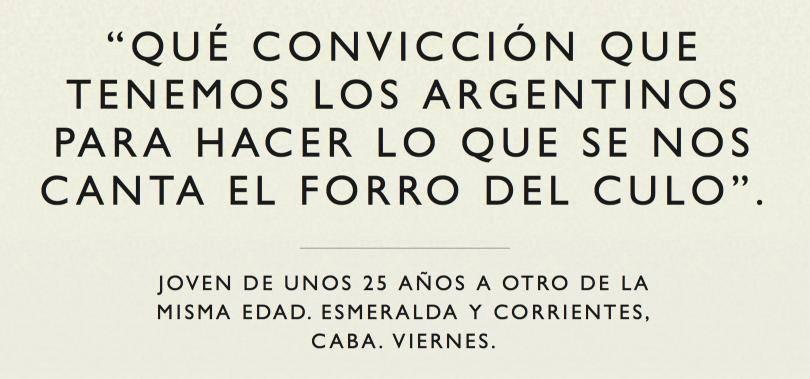
But what they came up with that day is more than fun. La Gente Anda Diciendo ("People Are Saying") is a “playful anthropological" glimpse into the Argentine mind and lifestyle — specifically in the capital. Mandelbaum and Goldman collect Buenos Aires phrases that betray the dry wit, blunt manner and casual attitude about love and life the locals have (even the little ones).
“In Buenos Aires, it’s easy [to overhear good stuff],” Mandelbaum says. “I don’t know if it’s because we shout a lot or because we’re not prudish. We can be on a bus, talking to the gynecologist at full volume. … Argentines get psychoanalyzed, it’s common to hear someone analyzing their partner’s life."
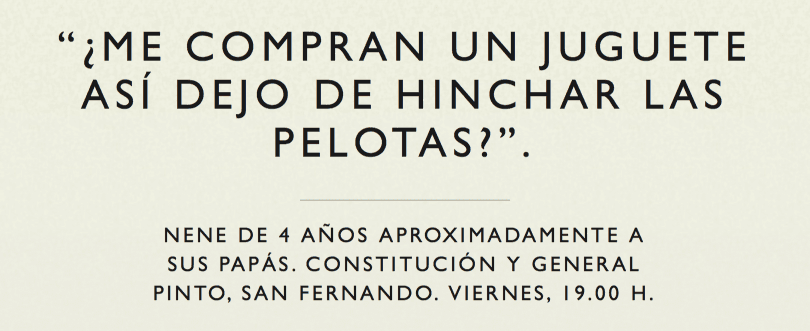
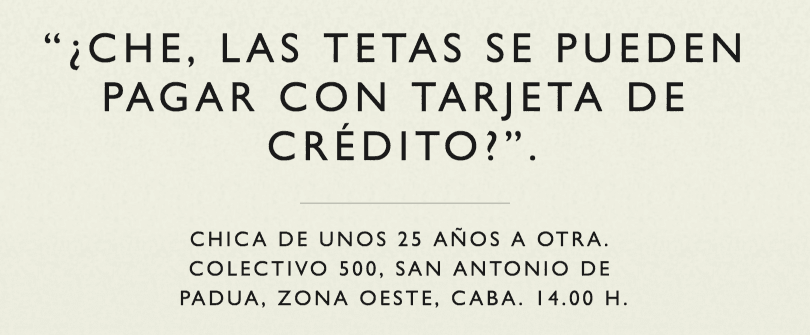
.jpg&w=1920&q=75)
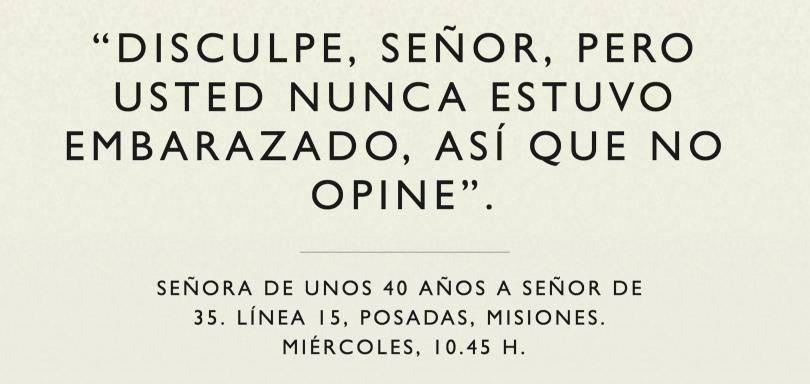
The original idea was to jot down phrases heard throughout Buenos Aires and make them into a book. After nine months of collecting phrases, Mandelbaum and Goldman decided to post them on Facebook. Overnight, they gained hundreds of followers, which then turned into thousands and tens of thousands.
The allure is the sharpness of the phrases, and the situations they allude to. There’s an art that goes into selecting phrases for this project.
“When you catch part of a sentence, it builds a story in your mind,” Mandelbaum says. “[We pick the] potent phrases, the ones that stir your imagination, that are funny.”
Now that fans submit 100 percent of the phrases, the most important element of this art is even more important: They have to be overheard and written down immediately.
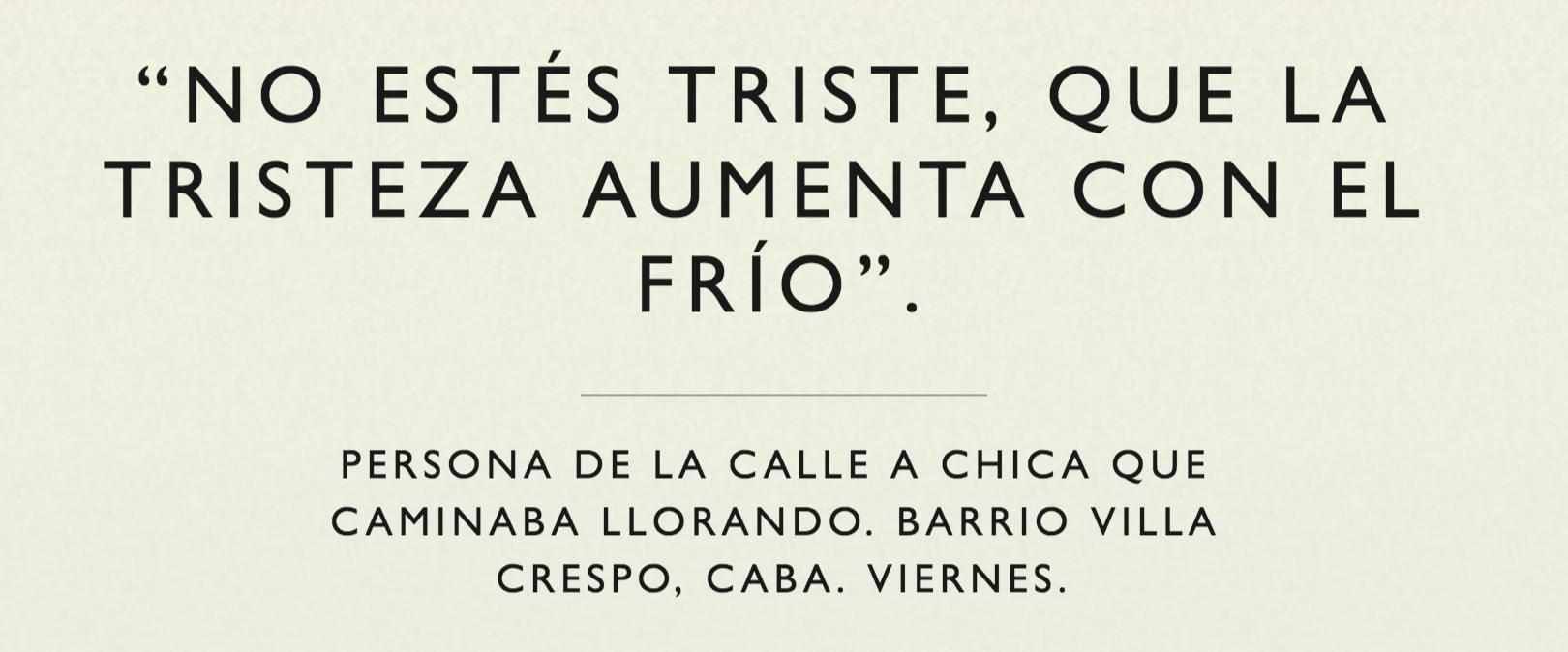

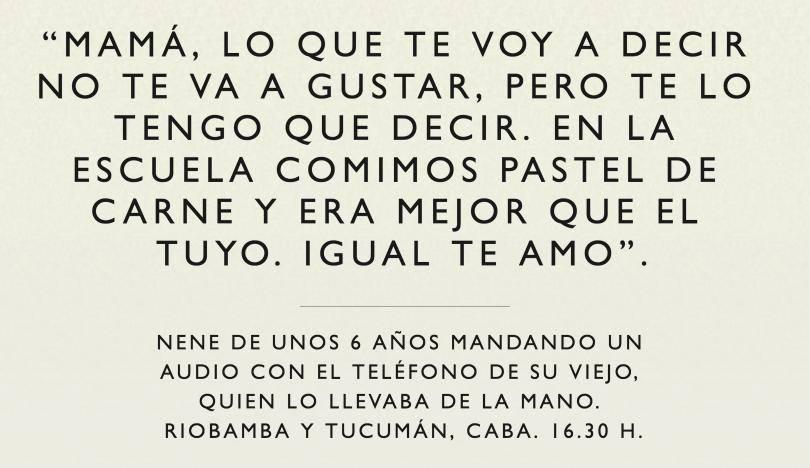
“It’s intuitive [telling which are made up],” says Mandelbaum, who’s an editor working in public relations. “You have to hear it and write it down then. When you try to write it down later, you edit the phrase in your head."
They’ve toured South America collecting phrases, sponsored by Motorola. They’ve published two books. They’ve inspired spin-offs in other cities and countries.
And there’s more coming: Mandelbaum says he and Goldman are hoping to have writers come up with texts inspired by the phrases.
With phrases like these coming in, that won’t be hard.
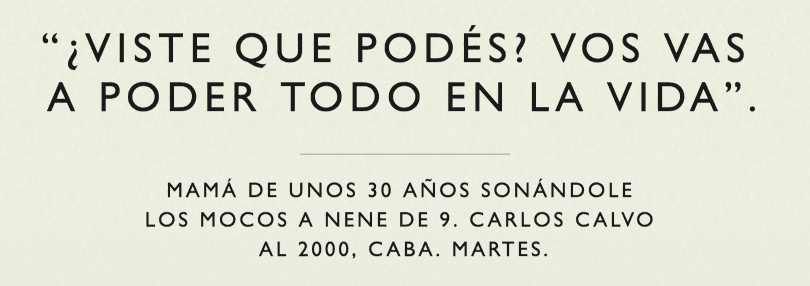
You're sitting in a cafe in Buenos Aires' Palermo neighborhood. You can't quite hear what the pair next to you is talking about, but you can make out some things. Maybe something like, "You think I have nothing better to do than be in love with you."
OK, that one was actually overheard on a subway. But when Ezequiel Mandelbaum and Tatiana Goldman were in a Palermo cafe one day, about five years ago, they thought the stuff they overheard was so intriguing, out of context, that they stopped talking to each other.
They just listened.
"We didn't understand what they were saying too well," Mandelbaum says. "But it was fun."
Note: Most of these phrases are nearly impossible to translate in a way that captures their full glory. But this is close.

But what they came up with that day is more than fun. La Gente Anda Diciendo ("People Are Saying") is a “playful anthropological" glimpse into the Argentine mind and lifestyle — specifically in the capital. Mandelbaum and Goldman collect Buenos Aires phrases that betray the dry wit, blunt manner and casual attitude about love and life the locals have (even the little ones).
“In Buenos Aires, it’s easy [to overhear good stuff],” Mandelbaum says. “I don’t know if it’s because we shout a lot or because we’re not prudish. We can be on a bus, talking to the gynecologist at full volume. … Argentines get psychoanalyzed, it’s common to hear someone analyzing their partner’s life."

.jpg&w=1920&q=75)

The original idea was to jot down phrases heard throughout Buenos Aires and make them into a book. After nine months of collecting phrases, Mandelbaum and Goldman decided to post them on Facebook. Overnight, they gained hundreds of followers, which then turned into thousands and tens of thousands.
The allure is the sharpness of the phrases, and the situations they allude to. There’s an art that goes into selecting phrases for this project.
“When you catch part of a sentence, it builds a story in your mind,” Mandelbaum says. “[We pick the] potent phrases, the ones that stir your imagination, that are funny.”
Now that fans submit 100 percent of the phrases, the most important element of this art is even more important: They have to be overheard and written down immediately.



“It’s intuitive [telling which are made up],” says Mandelbaum, who’s an editor working in public relations. “You have to hear it and write it down then. When you try to write it down later, you edit the phrase in your head."
They’ve toured South America collecting phrases, sponsored by Motorola. They’ve published two books. They’ve inspired spin-offs in other cities and countries.
And there’s more coming: Mandelbaum says he and Goldman are hoping to have writers come up with texts inspired by the phrases.
With phrases like these coming in, that won’t be hard.

Our coverage reaches millions each week, but only a small fraction of listeners contribute to sustain our program. We still need 224 more people to donate $100 or $10/monthly to unlock our $67,000 match. Will you help us get there today?
